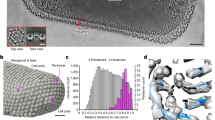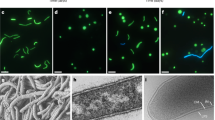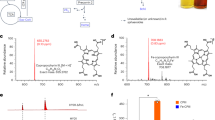Abstract
Smith and Worrel1 reported that the nitro-group of chloromycetin is reduced to an amino-group by the action of intact cells of certain bacteria. Recently, we have been able to achieve enzymic reduction of the nitro-group of the antibiotic by a cell-free extract from Streptococcus hœmolyticus. Further investigation with this preparation has provided strong evidence suggesting that the enzyme system responsible for this reduction may be identical with the nitrite reductase system first discovered by Yamagata2 in an autolysate of Pseudomonas aeruginosa. The present communication gives a brief report on these investigations.
This is a preview of subscription content, access via your institution
Access options
Subscribe to this journal
Receive 51 print issues and online access
$199.00 per year
only $3.90 per issue
Buy this article
- Purchase on Springer Link
- Instant access to full article PDF
Prices may be subject to local taxes which are calculated during checkout
Similar content being viewed by others
References
Smith, G. N., and Worrel, C. S., Arch. Biochem., 24, 216 (1949).
Yamagata, S., Acta Phytochimica (Japan), 11, 145 (1939).
Author information
Authors and Affiliations
Rights and permissions
About this article
Cite this article
EGAMI, F., EBATA, M. & SATO, R. Reduction of Chloromycetin by a Cell-free Bacterial Extract and its Relation to Nitrite Reduction. Nature 167, 118–119 (1951). https://doi.org/10.1038/167118a0
Issue Date:
DOI: https://doi.org/10.1038/167118a0
This article is cited by
-
Nitro-reductase from aNocardia sp.
Antonie van Leeuwenhoek (1964)
-
Physiological studies on the actinomycetes
The Botanical Review (1953)
Comments
By submitting a comment you agree to abide by our Terms and Community Guidelines. If you find something abusive or that does not comply with our terms or guidelines please flag it as inappropriate.



